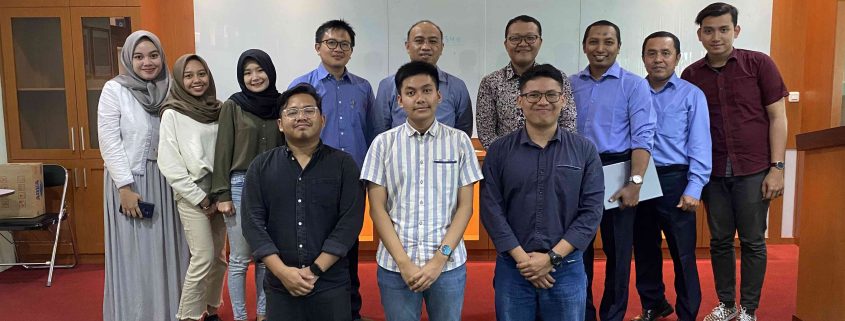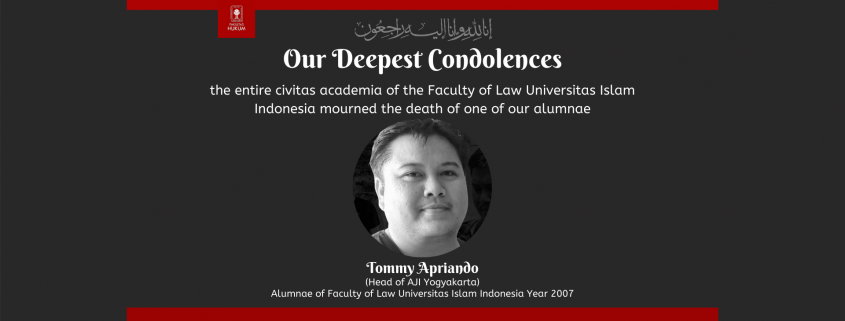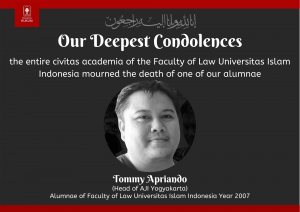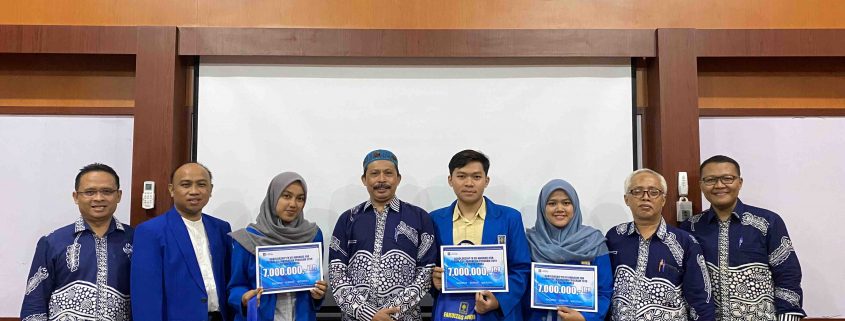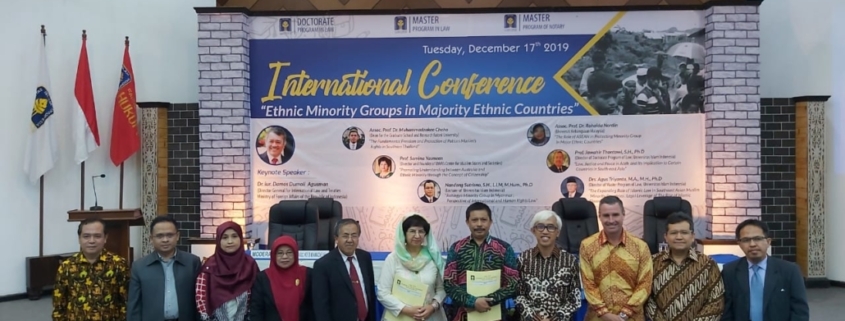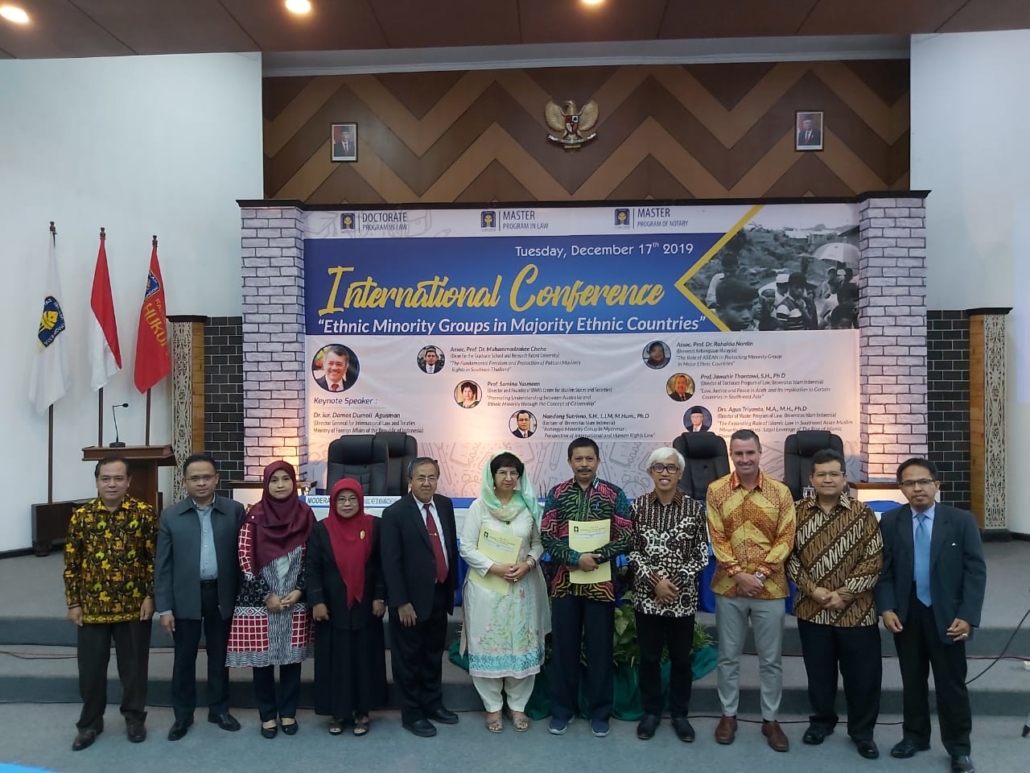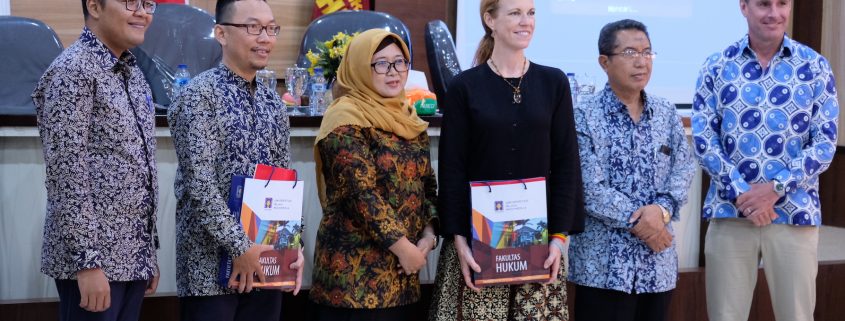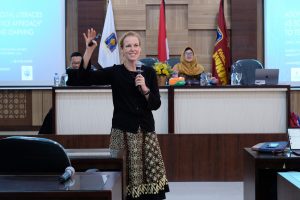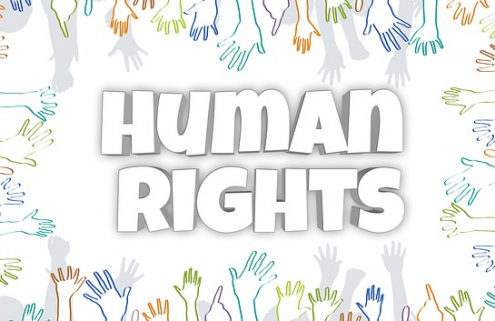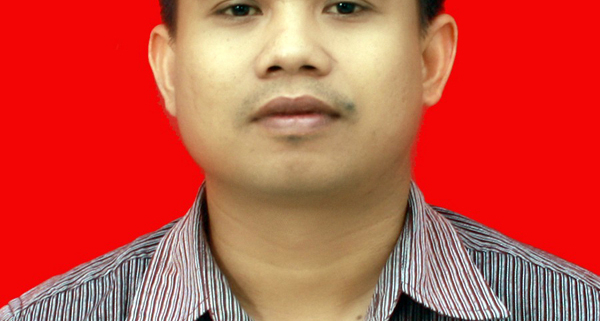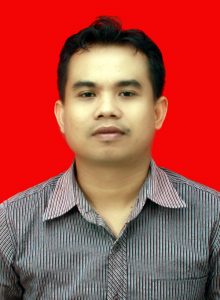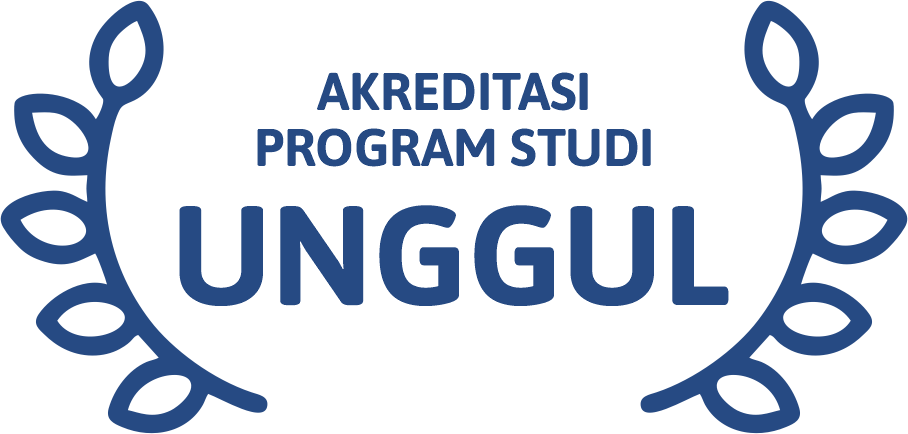Author: M. Syafi’ie, S.H., M.H.
Lecturer in Faculty of Law, Universitas Islam Indonesia, Departement of Constitutional Law
Mendiskusikan feminisme selalu akan diawali dengan pembahasan tentang gender. Apa makna keduanya? Gender berasal dari bahasa Inggris yang berarti jenis kelamin (sex). Dalam perkembangan, gender dan jenis kelamin dimaknai secara berbeda. Jenis kelamin dimaknai perbedaan laki-laki dan perempuan secara biologis semata. Sedangkan gender dimaknai sebagai pembagian laki-laki dan perempuan yang dikonstruksi secara sosial maupun kultural, seperti label bahwa perempuan bersifat lemah lembut, emosional, tidak mandiri, dan pasif. Pada sisi yang lain, laki-laki dianggap orang yang kuat, rasional, agresif, mandiri dan eksploratif. Gender yang awalnya hanya konstruksi sosial, dalam praktek terjadi penyimpangan yang salah satunya terlihat dari pola kerja laki-laki dan perempuan, di mana laki-laki bekerja di sektor publik, sedangkan perempuan dikhususkan untuk bekerja di sektor privat
Feminisme lebih progresif lagi, di mana paham ini tidak hanya berisi kritik terhadap sistem patriarkhi, tetapi lebih pada pengakuan dan sikap yang bersifat positif atas kebutuhan kaum perempuan sebagai sebuah kelompok. Dalam hal ini, feminisme bisa didefinisikan sebagai suatu kesadaran akan penindasan dan pemerasan terhadap perempuan dalam masyarakat, di tempat kerja dan dalam keluarga, serta tindakan sadar oleh perempuan maupun laki-laki untuk mengubah keadaan yang tidak adil. Gerakan feminisme merupakan paham yang memperjuangkan kebebasan perempuan dari dominasi laki-laki (Fadlan, 2011).
Sebagai satu respon pada ‘keyakinan bahwa terjadi diskriminasi serius’ benarkah kaum perempuan selama ini diberlakukan tidak adil? Dalam satu studi dikatakan, di banyak negara, termasuk di negara-negara Islam, perempuan secara umum mengalami peminggiran. Di banyak negara, tidak ada jaminan kesetaraan laki-laki dan perempuan di berbagai bidang, baik politik, sosial, ekonomi dan hukum. Di beberapa tempat, perempuan dibatasi hak kepemilikan tanah, mengelola property dan bisnis. Di kawasan sub Sahara Afrika sebagian besar perempuan memperolah hak atas tanah melalui suami atas dasar perkawinan dan hak tersebut hilang saat terjadi perceraian atau kematian sang suami. Di Asia Selatan, rata-rata jumlah jam yang digunakan perempuan bersekolah hanya separuh dari yang digunakan laki-laki. Jumlah anak perempuan yang mendaftar ke sekolah menengah di Asia Selatan hanya 2/3 dari jumlah anak laki-laki. Di negara-negara berkembang, wirausaha yang dikelola perempuan cenderung kekurangan modal, kalah dengan wirausaha yang dikelola laki-laki (Sukron Kamil, 2007)
Di Indonesia, kekerasan terhadap perempuan tidak kalah genting. Komnas Perempuan dalam catatan tahun 2018 menyatakan bahwa terjadi tren kekerasan dari tahun ke tahun, misal tahun 2015 yang berjumlah 321.752 kasus, tahun 2016 terdapat 259.150 kasus, dan pada tahun 2017 meningkat menjadi 346.446 kasus. Bentuk kekerasannya berupa kekerasan ekonomi, kekerasan psikis, kekerasan seksual, kekerasan fisik, eksploitasi pekerja migran, dan trafficking. Spektrumnya berupa kekerasan terhadap perempuan di dunia maya yang mencakup penghakiman digital bernuansa seksual, penyiksaan seksual, perseksusi online dan offline, maraknya situs dan aplikasi online berkedok agama (misal, ayopoligami.com dan nikahsiri.com), ancaman perempuan dengan Undang-Undang ITE, serta kerentanan eksploitasi seksual anak perempuan dan eksploitasi tubuh perempuan di dunia maya.
Merujuk pada Islam dan HAM
Penulis berkeyakinan bahwa Islam memiliki ajaran yang membebaskan. Seperti yang diulas oleh banyak sejarawan, betapa posisi perempuan di masa pra Islam begitu lemah, tidak berharga, dianggap aib, orang tua marah saat mengetahui memiliki anak perempuan, dan selalu berada di bawah subordinasi laki-laki. Setelah Islam datang, posisi perempuan terangkat, dihargai, dan diletakkan sebagai seorang manusia yang bermartabat. Pada waktu itu, perempuan bisa mendapatkan hak waris, bisa menjadi saksi, dan muncul beberapa doktrin agama yang begitu menghargai perempuan seperti surga berada di telapak kaki ibu, orang tua perempuan adalah orang yang paling layak dihormati dibanding dengan orang tua laki, perempuan adalah tiang agama, perempuan tiang negara dan seterunsya.
Dalam ajaran Islam, kita akan sangat mudah menemukan bagaimana relasi laki-laki dan perempuan yang terkonstruksi secara ideal. Terkait hal tersebut, Nasaruddin Umar mengemukakan bahwa banyak ayat-ayat dalam Al-Qur’an yang memperlihatkan doktrin kesetaraan gender. Pertama, prinsip kesetaraan gender merujuk pada realitas laki-laki dan perempuan dalam hubunannya dengan Tuhan, dimana keduanya sama-sama dilihat sebagai seorang hamba. Tugas seorang hamba adalah mengabdi dan menyembah. Dalam hal ini bisa dipahami dari firman Allah, “Dan tidaklah Aku menciptakan jin dan manusia kecuali untuk menyembah-Ku (Qs. Al-Dzariyat : 56). Kapasitas sebagai manusia, laki-laki dan perempuan juga sama, nilai derajatnya sama, yang membedakan kemuliaan seseorang hanya ketaqwaannya (Qs. Al-Hujurot : 13).
Kedua, laki-laki dan perempuan sama-sama diciptakan sebagai khalifah. Firman Allah, “Sesungguhnya Aku hendak menjadikan seseorang khalifah di muka bumi..(Qs. Al-Baqoroh : 30). Ayat ini menurut Nasaruddin Umar tidak menunjukkan pada jenis kelamin tertentu. Laki-laki dan perempuan memiliki fungsi yang sama sebagai khalifah yang akan mempertanggungjawabkan kekhalifahannya di muka bumi.
Ketiga, laki-laki dan perempuan sama-sama mengemban amanah dan menerima perjanjian primordial dengan Tuhan. Saat itu jenis kelamin bayi belum diketahui apakah laki-laki atau perempuan. Oleh karena itu, Allâh telah berbuat adil dan memberlakukan kesetaraan gender dengan terlebih dahulu ia harus menerima perjanjian dengan tuhannya (Qs. Al-A’raf : 172)
Keempat, kesetaraan gender dalam al-Qur’an dapat dilihat dari fakta bahwa antara Adam dan Hawa adalah aktor yang sama-sama aktif terlibat dalam drama kosmis. Kisah kehidupan mereka di surga, karena beberapa hal, harus turun ke muka bumi, menggambarkan adanya kesetaraan peran yang dimainkan keduanya. (Qs. Al-A’raf : 22)
Kelima, sejalan dengan prinsip kesetaraan, maka laki-laki maupun perempuan sama-sama berhak meraih prestasi dalam kehidupannya. Seperti firman Allah, “Barang siapa yang mengerjakan amal sholeh, baik laki-laki maupun perempuan dalam keadaan beriman, maka sesungguhnya akan kami berikan kepadanya kehidupan yang baik.. “ (Qs. An-Nahl : 97)
Berdasar uraian tersebut, dapat dikatakan bahwa Islam memberikan pesan kesetaraan antara laki-laki dan perempuan. Pertanyaannya, bagaimana saat kita ketemu dengan pesan Qur’an dan Hadist yang secara tidak langsung melemahkan posisi perempuan? Quraish Shihab menyatakan bahwa ada beberapa teks yang tercantum dalam Qur’an dan Hadist yang cenderung disalahpahami makna, pesan dan konteksnya. Karena itu, diperlukan bagi ‘seorang pembaca’ untuk memahami dengan baik dan benar dari sebuah ucapan atau redaksi. Menurut Quraish Shihab, pertama, memahami sebuah pesan tidak cukup dengan teks, tetapi penting untuk memahami konteksnya, Qur’an ada asbabun nuzulnya, sedangkan hadist ada asbabul wurudnya. Kedua, penting bagi pembaca untuk memahami kosa kota yang ada. Ketiga, melihat secara umum tuntunan Islam yang menyangkut tema-tema tertentu yang berpolemik, yang salah satunya terkait dengan persoalan gender.
Salah satu contoh pesan hadist yang sering disalahdipahami menurut Quraish Shihab ialah, “Seandainya aku akan memerintahkan seseorang sujud kepada seorang, niscaya aku perintahkan istri sujud kepada suaminya (HR. AT-Tirmidzi). Hadist ini disahalahpahami bahwa istri harus sepenuhnya patuh kepada suaminya, di mana level kepatuhannya menjadikan seorang perempuan lebur pada kepribadian suami sehingga tidak lagi memiliki hak menolak atau membantah. Ternyata, konteks (asbabul wurud) hadist ini tidak demikian. Diceritakan bahwa sahabat Nabi Mu’adz bin Jabal ketika kembali dari Syam dan menghadap nabi SAW, sang sahabat tersebut sujud kepada Nabi. Lalu Nabi bertanya, “apa ini wahai Mu’adz? Muadz menjawab, “Aku baru saja kembali dari Syam, dan kulihat mereka sujud kepada para rahib dan pendeta-pendetanya. Maka aku pun ingin melakukannya untukmu.” Disinilah Nabi SAW melarangnya hal demikian dengan bersabda, “Janganlah lakukan itu. Kalau seandainya aku memerintahkan seseorang sujud kepada orang lain, niscaya aku akan perintahkan istri sujud kepada suaminya” (HR. Tirmidzi dan Al-Hakim).
Dengan demikian, penjelasan di atas memperlihatkan kepada kita bahwa ajaran Islam sangat mendukung terhadap gerakan gender dan feminisme yang secara umum menuntut perlakuan yang adil antara laki-laki dan perempuan dalam ruang publik dan domestik. Dalam hal ini, ukuran posisi terbaik laki-laki dan perempuan semestinya dinilai dari kompetensi, prestasi, dan kemampuan terbaiknya, serta tidak lagi didasarkan pada semangat yang sekedar status sosial berdasarkan jenis kelamin.
Lebih jauh, ajaran Islam menurut penulis sangat kompatibel dengan norma-norma hukum HAM yang menjamin hak-hak kaum perempuan, diantaranya ialah Konvensi Penghapusan Segala Bentuk Diskriminasi Terhadap Perempuan. Konvensi ini kita ketahui memiliki tiga prinsip penting, yaitu prinsip non diskriminasi, prinsip persamaan (keadilan substantif), dan prinsip kewajiban negara. Secara normatif konvensi ini menjamin hak sipil dan politik perempuan (hak memilih dan dipilih, hak berpartisipasi, hak memegang jabatan dalam pemerintahan, hak kewarganegaraan, dan seterunsya), menjamin hak ekonomi, sosial dan budaya (hak atas pendidikan, hak kerja, hak kesehatan, dan seterusnya), hak persamaan di depan hukum, dan ada mekanisme pelaporan dan pemantauan terkait dengan pemenuhan hak-hak kaum perempuan.
Cukup banyak aturan dan kerjasama yang secara langsung dan tidak langsung saat ini muncul sebagai bagian untuk melindungi hak-hak perempuan, diantaranya Undang-Undang Tentang Penghapusan Kekerasan dalam Rumah Tangga, Mou Komnas Perempuan dan LPSK terkait Perlindungan Saksi dan Korban untuk Kasus-Kasus Kekerasan terhadap Perempuan, Penanganan Terpadu Kasus Kekerasan Terhadap Perempuan, Peraturan Mahkamah Agung tentang Pedoman Mengadili Perkara Perempuan yang Berhadapan dengan Hukum, dan beberapa yang lain. Secara umum, norma hukum dan kesepakatan-kesepakatan tersebut akan mencegah kaum perempuan menjadi korban ketidakadilan sosial.
This article have been published in Sindo Newspaper, 11 April 2019.

